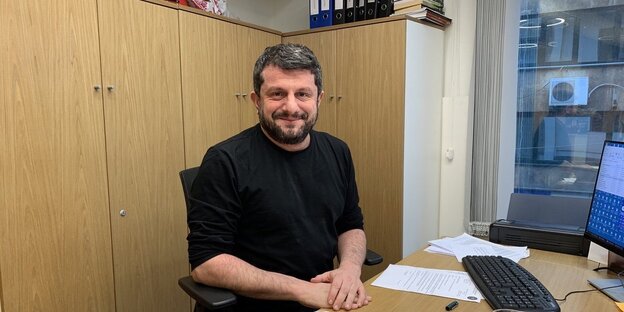Turkish Justice Minister Yılmaz Tunç has referred to Can Atalay, a jailed human rights lawyer who was elected to parliament in the May 14 elections but hasn’t been released despite gaining parliamentary immunity with his seat in the legislature, as a “convict,” local media reported on Wednesday.
Atalay is one of seven defendants sentenced to 18 years by an İstanbul court in April 2022 in a trial concerning the anti-government Gezi Park protests of 2013, which erupted over government plans to demolish Gezi Park in Taksim. After an appellate court ruled in December that the April verdict “complied with the law,” the defense appealed the case at Turkey’s Supreme Court of Appeals.
Tunç on Wednesday spoke to the press about the latest developments in the situation of Atalay, one of four Workers’ Party of Turkey (TİP) deputies elected to parliament on May 14.
“Applications have been made to the [Turkish Grand National Assembly] Presidency [about Atalay]. … Currently, his case is ongoing in the Supreme Court of Appeals as a convict. There’s a verdict that was reached. The Presidency of the Assembly will act based on the response to be received from the Supreme Court of Appeals,” Tunç said.
The statement by the minister, in which he referred to Atalay as a “convict” while the case is still ongoing in the Supreme Court of Appeals, drew strong criticism from TİP and was perceived as an instruction to the judiciary.
TİP Chairman Erkan Baş on Wednesday said in a tweet in response to the minister that there was no “final verdict” in the case.
“If there is a verdict, how was he [Atalay] able to run [for a seat in parliament] and get elected? If he is not a member of parliament, how can he be a candidate for the Presidency of the parliament in the current election?” TİP leader said, addressing Tunç.
1- Kesinleşmiş hüküm yok, dosya Yargıtay’da.
2- Kesin hüküm olmadığına göre Anayasa 14 kapsamında olduğuna kim, nasıl karar veriyor?
3- Hüküm varsa nasıl aday olabildi ve seçildi?
4- Milletvekili değilse şu anda yapılan seçimde nasıl TBMM Başkanlığı’na aday olabiliyor? https://t.co/nKFVKw75rS— Erkan BAŞ (@erkbas) June 7, 2023
Lawyer Özgür Urfa, a TİP party council member, also responded to the minister on social media, saying he had already concluded the trial in his own mind assuming the role of the court and making the decision on Atalay by referring to the MP as a “convict.”
“If this statement by the minister is not a clear instruction to the judiciary, then what is it?” Urfa added.
Adalet Bakanı, temyiz aşamasında olan ve henüz kesinleşmemiş bir davada yargılanan Can Atalay için "hükümlü" ibaresi kullanarak yargılamayı kendi kafasında bitirmiş ve mahkeme yerine geçerek karar vermiş.
Bakanın bu beyanı yargıya verilmiş açık bir talimat değilse nedir ? https://t.co/2nsH3CXwG5— Özgür Urfa (@OzgurUrfa) June 7, 2023
Meanwhile, 700 people, including academics, legal professionals, artists, journalists and authors, jointly called on the Supreme Court of Appeals to adhere to Article 83 of the Constitution in the case of Atalay in a written statement, according to a report by the İleri Haber news website on Wednesday.
The article says that the execution of a criminal sentence imposed on a deputy either before or after his or her election shall be suspended until he or she ceases to be a member of parliament.
The signatories said in the statement titled “Respect for law and the will of the people: freedom for Can Atalay!” that the continued detention of the MP constituted a violation of personal liberty and security, as well as an infringement on the rights of representation of the voters, “in clear defiance of the law.”
Last year Atalay was among seven Gazi Park trial defendants along with prominent businessman Osman Kavala who were named “prisoners of conscience” by Amnesty International after a high-level delegation led by lawyer Kerem Dikmen, the organization’s Turkey chair, visited them behind bars.
Amnesty defines prisoners of conscience as people who haven’t used or advocated violence or hatred in the circumstances leading to their imprisonment but are imprisoned solely because of who they are (sexual orientation, ethnic, national or social origin, language, birth, color, sex or economic status) or what they believe (religious, political or other conscientiously held beliefs).
Atalay and the other Gezi Park trial defendants were given jail sentences on charges of aiding a coup attempt, while Kavala, who had been behind bars since 2017, was given a life sentence without the possibility of parole on conviction of attempting to overthrow the government by financing the Gezi Park protests.
The government described the protests as a coup attempt against it. Eleven protestors died and thousands more were injured as they were brutally suppressed by the police on instructions from then-prime minister and current president Recep Tayyip Erdoğan.
